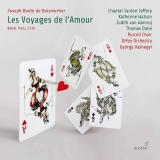Das vieraktige Ballett mit Prolog Les Voyages de l‘Amour stellt die erste große Arbeit des schon bekannten Boismortier in Paris dar. Er bediente sich dazu des Librettos des hoch gelobten Charles-Antoine Leclerc de la Bruère. Dass das Stück dagegen nicht so gelobt wurde, mag daran liegen, dass Boismortier, vermutlich um es möglichst gut zu machen, über die Stränge schlug. Er füllte die Partitur mit allzu gefühlvoll ausstaffierten Akzenten oder erzählerischen Episoden, die die Musik zu gehaltvoll für ein Ballett machten. Denn mit tragisch großen Rollen für die Hauptcharaktere geht er auch über den gemischten Charakter beim Ballett hinaus.
In der Handlung geht es um Amor, der nicht nur andere mit der Liebe beglücken möchte, sondern diese auch selber erfahren will. Deshalb begibt er sich zunächst aufs Land, dann in die Stadt und schließlich an den Hof. Das Resümee ist, dass das Landleben das Unverfälschte und wahre ist, da in der Stadt zu leichtlebig, am Hofe zu weltlich und bei beiden treulos zugeht. Für den zweiten Akt in der Stadt hat Boismortier eine zweite Version geschaffen, die in dieser Einspielung ebenfalls zu hören ist. So kann man selbst vergleichen und vielleicht hören, dass die neue Version nicht unmittelbar erkennbar besser ist.
Diese zwei prall gefüllten CDs werden von einem ebenso dicken wie informativen Beiheft inklusive zweisprachigem Libretto begleitet. Daraus ergibt sich auch, dass die Männerrollen von L‘Amour und Zéphire von Frauenstimmen gesungen werden, wie es der Komponist vorgesehen.
Die Interpreten dieser Aufnahme sind schon seit langem aufeinander eingestellt. Sowohl die Solisten als auch der Purcell-Chor und das Orfeo-Orchester haben schon miteinander agiert. Der Leiter György Vashegyi stammt ebenso wie die beiden Ensembles aus Ungarn. Vashegyi setzt bei seinen Interpretationen auf einen maßvollen Ansatz. So wählt er Tempi, die dem Klang Zeit geben, aufzublühen und Details zu offenbaren. Wer fetziges Musizieren sucht, zupackendes Auftrumpfen, der wird nicht belohnt. Dafür überzeugen die Interpretationen durch intensive Deutungen, welche nicht nur die langsamen Sätze beleben. Bei gepflegt ausbalanciertem Auftritt zeigt sich der Purcell-Chor als flexibel und aufmerksam agierende Gesangsgruppe, das Orfeo-Orchester als munter und gepflegt musizierendes Kollektiv, dass die gestalterischen Ideen des Dirigenten so aufnimmt, dass sie erklingen können.
Wieder einmal sehr gut singt Chantal Santon Jeffery als L’Amour, doch auch Katherine Watson als Zéphire steht ihr in Nichts nach, ebenso wenig Judith van Wanroij in der Rolle der Daphne. Noch zu nennen ist der einzige Sänger der Besetzung, Thomas Dolié. In diversen Rollen kann er glänzen. Auch in den Nebenrollen sind überzeugend besetzt. So lohnen sich Einspielungen unbekannterer Werke.
























